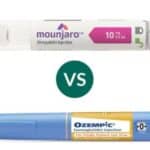
What Are The Best Prescription Weight Loss Drugs?
What Are The Best Prescription Weight Loss Drugs? Obesity has become a global epidemic, with millions of people struggling to lose weight and improve their health. The prevalence of obesity has increased significantly over the past few decades, and it is now considered a major public health concern.
Many individuals try various methods to lose weight, including dieting and exercising, but often find it difficult to achieve long-term success. This is where prescription weight-loss drugs come into play.
Prescription weight-loss drugs are medications that are specifically designed to help individuals lose weight. They are typically prescribed by a healthcare professional and are intended for individuals who have a body mass index (BMI) of 30 or higher, or those with a BMI of 27 or higher with obesity-related health conditions such as diabetes or high blood pressure.
These drugs can be an effective tool in the battle against obesity when used in conjunction with a healthy diet and regular exercise.
Understanding the Different Types of Prescription Weight-Loss Drugs
There are several different categories of prescription weight-loss drugs, each with its own mechanism of action. The most common types include appetite suppressants, fat blockers, and drugs that increase metabolism.
Appetite suppressants work by reducing feelings of hunger and increasing feelings of fullness. They target the brain’s appetite control center, helping individuals eat less and feel satisfied with smaller portions. Examples of appetite suppressants include phentermine and diethylpropion.
Fat blockers, on the other hand, work by preventing the absorption of dietary fat in the intestines. These drugs inhibit the action of enzymes that break down fat, leading to a decrease in the amount of fat absorbed by the body. Orlistat is a commonly prescribed fat blocker.
There are glucagon-like peptide-1 (GLP-1) receptor agonists like semaglutide and tirzepatide that help regulate blood sugar levels by increasing insulin secretion when blood sugar levels are high. They also reduce the amount of glucose released by the liver. They also can slow gastric emptying and promote a feeling of fullness, which can lead to reduced calorie intake and weight loss.
Lastly, there are drugs that increase metabolism, such as liraglutide. These medications work by increasing the body’s metabolic rate, helping individuals burn more calories and lose weight more effectively.
Top Prescription Weight-Loss Drugs: An Overview

Semaglutide Tablets And Vials
There are several prescription weight-loss drugs on the market that have been proven to be effective in helping individuals lose weight. Some of the top drugs include semaglutide, phentermine, orlistat, liraglutide, and naltrexone/bupropion.
Semaglutide was initially developed for the treatment of type 2 diabetes but has also been found effective for weight loss in individuals with or without diabetes. The weight loss benefits are primarily due to its ability to decrease appetite and calorie intake.
Phentermine is an appetite suppressant that is commonly prescribed for short-term use. It works by stimulating the release of certain chemicals in the brain that control appetite. Phentermine is typically used in conjunction with a reduced-calorie diet and exercise program.
Orlistat, also known as Xenical or Alli, is a fat blocker that inhibits the action of enzymes that break down fat in the intestines. This leads to a decrease in the absorption of dietary fat, resulting in weight loss. Orlistat is typically used in conjunction with a low-fat diet.
Liraglutide is a medication that was originally developed to treat diabetes but has also been found to be effective in promoting weight loss. It works by mimicking a hormone called glucagon-like peptide-1 (GLP-1), which helps regulate appetite and food intake. Liraglutide is typically used in conjunction with a reduced-calorie diet and increased physical activity.
Naltrexone/bupropion is a combination medication that works by targeting the brain’s reward system, reducing cravings and promoting feelings of fullness. It is typically used in conjunction with a reduced-calorie diet and increased physical activity.
How Do Prescription Weight-Loss Drugs Work?
Prescription weight-loss drugs work through various mechanisms to help individuals lose weight. Appetite suppressants, such as phentermine, work by stimulating the release of certain chemicals in the brain that control appetite. This leads to a decrease in hunger and an increase in feelings of fullness, helping individuals eat less and lose weight.
Fat blockers, such as orlistat, work by inhibiting the action of enzymes that break down fat in the intestines. This leads to a decrease in the absorption of dietary fat, resulting in weight loss. Fat blockers are typically taken with meals that contain fat to maximize their effectiveness.
Drugs that increase metabolism, such as liraglutide, work by increasing the body’s metabolic rate. This leads to an increase in calorie expenditure, helping individuals burn more calories and lose weight more effectively.
Benefits and Risks of Prescription Weight-Loss Drugs
Prescription weight-loss drugs can offer several benefits for individuals struggling with obesity. The most obvious benefit is weight loss, which can lead to improved health outcomes and a reduced risk of obesity-related conditions such as diabetes, high blood pressure, and heart disease. These drugs can also help individuals develop healthier eating habits and improve their overall quality of life.
However, it is important to note that prescription weight-loss drugs also come with potential risks and side effects. Common side effects include nausea, diarrhea, constipation, and headache. In some cases, these drugs can also have more serious side effects such as increased heart rate, high blood pressure, and liver damage. It is important for individuals considering these medications to discuss the potential risks and benefits with their healthcare provider.
Who is a Good Candidate for Prescription Weight-Loss Drugs?
Not everyone is a good candidate for prescription weight-loss drugs. These medications are typically prescribed for individuals who have a BMI of 30 or higher, or those with a BMI of 27 or higher with obesity-related health conditions. It is important for individuals considering these medications to have a thorough evaluation by a healthcare professional to determine if they are a good candidate.
In addition to BMI, other factors that may be taken into consideration include overall health status, medical history, and lifestyle factors. It is important for individuals to be committed to making lifestyle changes, such as adopting a healthy diet and increasing physical activity, in order to achieve long-term success with these medications.
Comparing the Top Prescription Weight-Loss Drugs: Which One is Right for You?

Compounded Semaglutide
When it comes to choosing the right prescription weight-loss drug, there is no one-size-fits-all answer. Each drug has its own unique benefits and risks, and what works for one person may not work for another. It is important for individuals to discuss their options with a healthcare professional to determine which drug is the best fit for their individual needs and goals.
Phentermine is a commonly prescribed appetite suppressant that is typically used for short-term use. It can help individuals jumpstart their weight loss journey and develop healthier eating habits. However, it is important to note that phentermine can be habit-forming and should only be used under the guidance of a healthcare professional.
Orlistat is a fat blocker that can be an effective tool for individuals who struggle with portion control and have difficulty reducing their fat intake. It is typically used in conjunction with a low-fat diet and can help individuals lose weight and improve their overall health.
Semaglutide is a medication that was originally developed to treat diabetes but has also been found to be effective in promoting weight loss. It works by mimicking a hormone called glucagon-like peptide-1 (GLP-1), which helps regulate appetite and food intake. Semaglutide can be an effective option for individuals who struggle with cravings and portion control.
Naltrexone/bupropion is a combination medication that works by targeting the brain’s reward system, reducing cravings and promoting feelings of fullness. It can be an effective option for individuals who struggle with emotional eating and have difficulty controlling their food intake.
Lifestyle Changes: A Winning Combination
While prescription weight-loss drugs can be an effective tool in the battle against obesity, they are not a magic solution. In order to achieve long-term success, it is important for individuals to make lifestyle changes in conjunction with these medications.
Lifestyle changes such as adopting a healthy diet and increasing physical activity can enhance the effectiveness of prescription weight-loss drugs. These changes can help individuals develop healthier habits and improve their overall health. It is important for individuals to work with a healthcare professional or registered dietitian to develop a personalized plan that is sustainable and realistic.
Potential Side Effects
Prescription weight-loss drugs can come with potential side effects that individuals should be aware of. Common side effects include nausea, diarrhea, constipation, and headache. These side effects are typically mild and go away on their own as the body adjusts to the medication.
In some cases, these drugs can also have more serious side effects such as increased heart rate, high blood pressure, and liver damage. It is important for individuals to be aware of these potential risks and to discuss them with their healthcare provider. It is also important to follow the prescribed dosage and to report any unusual symptoms or side effects to a healthcare professional.
Conclusion
Prescription weight-loss drugs can be an effective tool in the battle against obesity when used in conjunction with a healthy diet and regular exercise. They can help individuals lose weight, improve their health outcomes, and develop healthier habits. However, it is important for individuals to make an informed decision about whether these medications are right for them.
It is important to discuss the potential risks and benefits with a healthcare professional and to consider factors such as overall health status, medical history, and lifestyle factors. It is also important to be committed to making lifestyle changes in order to achieve long-term success with these medications. By taking a comprehensive approach that includes both prescription weight-loss drugs and lifestyle changes, individuals can increase their chances of achieving their weight loss goals and improving their overall health.






